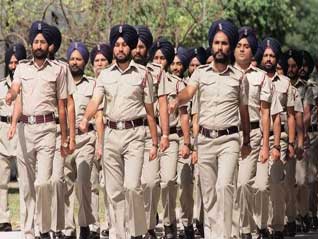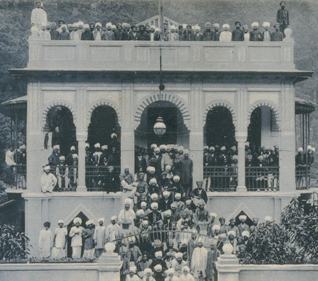
Above: Sikh soldiers at their final parade on Stonecutters Island ahead of Hong Kong's handover to China in 1997. Photo: K.Y. Cheng. Courtesy: South China Morning Post. Below: the original gurdwara building.

Travel
A Home Away From Home:
Gurdwara Khalsa Diwan,
Wan Chai, Hong Kong
ELLIE NG
Every day, Kashmir Singh helps at the free kitchen at the Gurdwara Khalsa Diwan in Wan Chai, Hong Kong. He visits in the morning before work, and comes again during lunch hours.
The 65-year-old has been doing this almost nonstop for more than 40 years. To him, the community kitchen – known as Langar – is a vital part of his Sikh faith and a symbol of equality and brotherhood.
“I like helping out in the langar because it is part of our service to God and humanity,” Kashmir Singh, who came to the city from Punjab when he was a teenager, said in proficient Cantonese.
Anyone can get a free meal at the daily, day-and-night community kitchen. Volunteers begin cooking rice, lentils and other vegetarian dishes as early as 4 am. Roti is made from scratch, cooked on a stove and served fresh to guests.
The langar was established in rejecting the central Hindu belief in the caste system that prohibited people of different castes from eating together. In the Sikh free kitchen, everyone eats the same food sitting together. Everyone.
“We welcome everyone, because we believe in equality,” the Khalsa Diwan’s caretaker, Gurmel Singh explained. “Everyone can come to the prayer hall. For langar, everyone is welcome to come and eat the food. Nobody will ask who you are.”
He said the gurdwara receives a lot of school visits, having served around 25,000 students since he came to work here at the gurdwara eight years ago. The tours introduce the Sikh religion and way of life to visitors.
“[The tours] are very important because Hong Kong people don’t know much about the Sikh religion,” he said.
Understanding brings respect, Gurmel Singh added. “Then they would know Sikhism is a religion of peace, love [and] tolerance.”
A relatively young religion -- yet, the world‘s fifth largest, with more than 30 million adherents -- Sikhism was founded in the Punjab region by Guru Nanak in the 15th century. It advocates peace and service to humanity.
The largest langar is located at the Golden Temple in Amritsar, Punjab where some 100,000 people are fed every day. The Khalsa Diwan in Hong Kong serves around 200 people on a weekday and 1,500 on Sundays. It also regularly donates grocery items to the food assistance programme ‘Food Angel‘.
The Khalsa Diwan was built in 1901 by Sikhs from the British army. During the WWII, it saved lives by providing shelter for locals. Its well – now dried up – was an important source of drinking water for those seeking refuge inside the property.
The gurdwara survived the war and occupation, though parts of it were destroyed. One of the granthis was killed when the Japanese army threw a bomb onto the front side of the gurdwara, said the Khalsa Diwan’s president, Sukha Singh Gill.
Today, traces of the war are no longer visible on the property. Two trees stand guarding the spacious yard and provide shade for people chatting underneath over a cup of cha.
Visitors are required to cover their head, which is regarded by Sikhs as a symbol of humility and harmony with god.
To some, the free kitchen helps them get through the day without going hungry.
James Kong, 43, said he relies on temporary jobs and comes to the free kitchen whenever he does not have work.
He usually eats by himself. Sometimes he exchanges a few words with other visitors, though he finds the language barrier to be an issue.
The langar also helps refugees.
But the Khalsa Diwan is more than just a meal provider. It is a place where refugees get a taste of home.
Having only arrived in the city last November, refugee Sukhi Singh said he likes Hong Kong, though he feels homesick whenever he walks on the street.
“I feel sad when I am outside [the gurdwara] because I think about my family, my mom and dad,” he said. “But inside, I eat and I am happy. I feel like home. I make many friends.”
Still adjusting to life in the city, Sukhi has had a few encounters with police because of his religious practice. He carries a kirpan on his person, as part of his spiritual practice and discipline. The Kirpan symbolises courage and one’s duty to help one’s fellow man.
But a kirpan is still an uncommon sight in the city. Sukhi said he had been taken to police stations a few times on suspicion of possessing a weapon after officers stopped him on the street. He said he explained to them the meaning of the sword and was allowed to keep it.
Sukhi is not the only refugee who frequents the temple. Roomi, who has been in Hong Kong for nine years, said the gurdwara helps him overcome boredom as Hong Kong laws prohibit refugee claimants from working for wages.
He stays in a tiny flat in Sai Ying Pun, four subway stations away from the gurdwara. He socialises with friends at the gurdwara during the day and watches TV at home at night. He also picked up Cantonese language skills from people he plays football with at the Southorn Playground in Wan Chai.
Roomi will soon end his long years of waiting in the city, as he is set to join his sister in Canada in September. “I am very excited,” he said, adding that he is a bit worried about the cold weather there.
The Khalsa Diwan also draws many backpackers from around the world. One of them is former baker Samuel Bessette from Quebec, Canada. The 21-year-old said he had been travelling in Asia for over a year and had spent two months in Hong Kong.
He heard about the gurdwara from a friend soon after he arrived in the city. He volunteers in the kitchen as a form of paying back for the free meal he receives.
Bessette was also impressed by the generosity of Sikhs he met at the gurdwara. He said he was wearing a pair of worn-out trousers when he arrived in the city, and a Sikh in the gurdwara gave Bessette his own pair.
“He said you should take it because you need it more than I do,” Bessette recalled. “They would do everything they can to help others. It is like family.”
“You don’t get this proximity in this busy Hong Kong. Everything goes fast outside. It’s about efficiency and individualism,” he said. “But the gurdwara is about community – taking your time, going slowly, enjoying your cup of cha and passing your time here.”
“When you pass this fence,” he said, “it is not Hong Kong anymore. It is Punjab.”
[Courtesy: Hong Kong Free Press. Edited for sikhchic.com]
May 13, 2017


